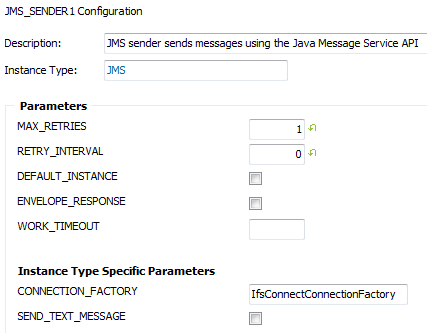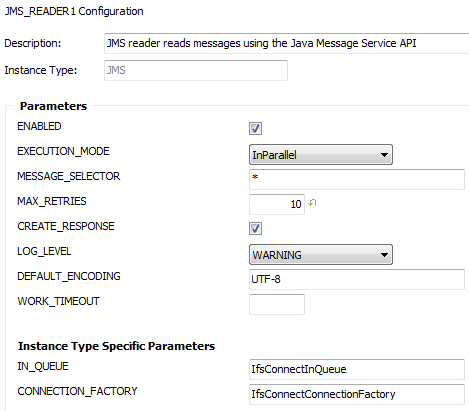| Foundation1 / Administration Guide / Integration / Ifs Connect / Configure Connect / Transport Connectors / |
The JMS transport connector makes it possible to exchange message between IFS Applications and a Java Message Service (JMS) system.
The JMS Reader monitors a dedicated JMS queue for inbound messages in binary or text format and executes them.
The JMS Sender has the possibility to send files in different xml-formats, plain text or binary to another, dedicated JMS queue.
Note: JMS Sender and Reader can only access JMS queues within the actual instance of Middleware Server. If it is necessary to access third party JMS brokers, like IBM WebSphere MQ, mechanisms like Foreign JMS Servers or JMS Bridges can be used.
Note: By default the installer creates one connection factory with name IfsConnectConnectionFactory and three queues: IfsConnectInQueue, IfsConnectResponseQueue and IfsConnectOutQueue.

IfsConnectConnectionFactory.Additional parameters are specified on Routing Address for
Destination Type JMS.
Note that JMS sender can only send to a JMS queue that is defined in the actual application server.

IfsConnectInQueueIfsConnectConnectionFactory.Note that JMS Render can only read from a JMS queue that is defined in the actual application server.
By default the installer creates one connection factory with name IfsConnectConnectionFactory and three queues: IfsConnectInQueue, IfsConnectResponseQueue and IfsConnectOutQueue. If necessary it is possible to define more queues using the WLST scripting tool or by editing the <ifs_home>\wls_domain\<instance_name>\config\config.xml file.
The file <ifs_home>\instance\<instance_name>\jms.zip contains two python scripts together with two shell scripts and a properties file that configures the python scripts. One script is to add necessary .jar files to the class path of the Integration server. And other script is to create the MQ foreign server with queues.
For the usage of these scripts refer Integrate JMS Connector with a third party JMS Broker.pdf file packed inside jms.zip.
Note: These scrips will do all required configurations in the application server to integrate WebLogic JMS with any other MQ server. The configurations required for MQ server should be done separately .